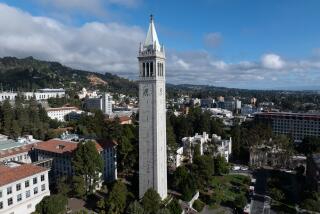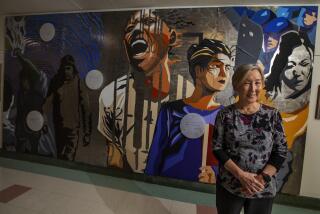New Berkeley Center Pursues Study of Peace
- Share via
BERKELEY — The timing may seem all wrong, the central notion sadly outdated, and the setting too obvious for skeptics. But scholars at the University of California’s new Center for the Development of Peace and Well-Being believe there’s never been a better time for the psychological study of positive attributes like love, gratitude and compassion.
Indeed, in post-Sept. 11 America, where news of terrorism and war have become a background hum of everyday life, they say now is the time to give peace--and its scientific study--a chance.
“Some of the most interesting ways in which people find peace and well-being is in the context of trauma,” says Dacher Keltner, director of the center. “There are a lot of ways in which our work is very germane to what’s happening as a function of 9/11--the anxiety, fragmentation, family disruption, nightmares. We can speak to that.”
Based in the traditionally liberal university’s Department of Psychology, Berkeley’s peace center might seem to have incongruous roots: It was founded with a $1-million grant from a real estate developer who supported the election of President Bush.
Thomas and Ruth Ann Hornaday attended Berkeley in the early ‘60s, as the free speech movement launched an era of liberal student activism in America. Thomas Hornaday was stationed as a naval officer at nearby Treasure Island. He said he was “anything but a hippie,” while attending the university.
Now a Phoenix real estate developer, Hornaday describes himself as “a very conservative person, economically.”
Still, he has little patience with those who would ridicule a center devoted to the study of peace. “There’s a lot of shallow thinking going on,” he says. “If there’s someone who pooh-poohs the idea, they’re probably in need of a deeper insight. I’m pretty comfortable with it myself.”
The center recently hosted its first symposium--on “Children Who Thrive in the Face of Adversity.” And it is beginning to see the first fruits of a fellowship program that has drawn interest from student-scholars in various fields.
But the center’s most difficult challenge may be in establishing its identity, and laying to rest doubts that its mission is now somehow beside the point. It has tried to accomplish this by acknowledging from the outset the new post-terrorist milieu.
“Nobody would think of peace if there wasn’t conflict,” observes Philip Cowan, a UC psychologist who studies family issues. “Peace is one state in life. The question is not just how do you get there--because you don’t stay there--but how it is connected, how in the face of conflict, challenge and adversity you sometimes can get some kind of deliverance.”
Cowan and Keltner say their think tank is not about solutions to global conflicts but, rather, about the individual’s peace of mind. From the latter, they hope, might come the former.
Future topics of study will include: the development of love and compassion, coping with significant personal loss, improving marital and parent-child relationships, conflict resolution and pro-social interactions in school and peer settings.
Of course, balancing the rational and scientific with the warm and fuzzy is no easy task. The center’s founders insist it will be a place for rigorous scientific study.
Still, they acknowledge a nontraditional approach.
“In my field, I study positive states,” Keltner says. “Well, you go to the scientific literature and there may be 800 studies on anger and just 60 studies on reconciliation or gratitude. There are perhaps 12,000 studies of fear and only 70 studies of hope.”
The center scholars, scattered around the Berkeley campus, want to spread their discussions off campus to parents, teachers and health-care professionals. They plan to publish their studies in nonscientific jargon.
“We’re bucking psychology,” Cowan says. “We think this should have some public relevance.”
Says Hornaday: “You’ve got to approach it at an individual level. That’s where peace starts. It’s in the heart of you and me.”






